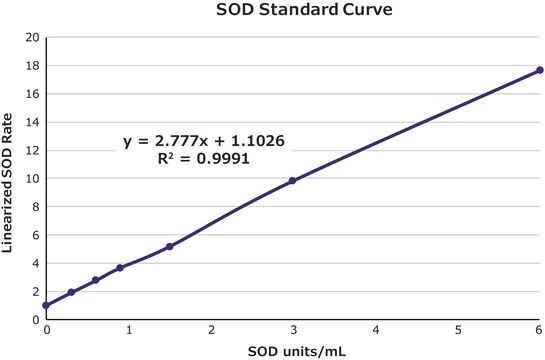MAK145
Fluorometric Intracellular Ros Kit
sufficient for 200 fluorometric tests (red)
Synonim(y):
Wewnątrzkomórkowy test fluorescencji ROS
Zaloguj sięWyświetlanie cen organizacyjnych i kontraktowych
About This Item
Kod UNSPSC:
12161503
NACRES:
NA.25
Polecane produkty
zastosowanie
sufficient for 200 fluorometric tests (red)
metoda wykrywania
fluorometric
powiązane choroby
neurological disorders; cancer
temp. przechowywania
−20°C
Opis ogólny
Reactive oxygen species (ROS) are generated as a result of the reduction of oxygen during aerobic respiration and by various enzymatic systems within the cell. At physiological levels, ROS contribute to cell signaling and host defense. Increased ROS generation, above the detoxification capacity of the biological system, results in oxidative stress and cellular damage. The main damage to cells results from the ROS-induced alteration of macromolecules such as polyunsaturated fatty acids in membrane lipids, essential proteins, and DNA. ROS has been implicated in disease states, such as Alzheimer′s disease, Parkinson′s disease, cancer, and aging.
Zastosowanie
Fluorometric intracellular reactive oxygen species (ROS) Kit has been used for detection of intracellular ROS in live cells.
Przydatność
This kit is suitable for the detection of intracellular ROS by fluorescence microplate reader or a fluorescent microscope.
Zasada
The kit provides a sensitive, one-step fluorometric assay to detect intracellular ROS (especially superoxide and hydroxyl radicals) in live cells within 1 hour incubation. ROS react with a cell-permeable sensor, resulting in a fluorometric product (λex = 520/λem = 605 nm) proportional to the amount of ROS present The assay can be performed in either a 96 or 384 multiwell plate format using a fluorescence microplate reader.
Ta strona może zawierać tekst przetłumaczony maszynowo.
Kod klasy składowania
10 - Combustible liquids
Klasa zagrożenia wodnego (WGK)
WGK 3
Temperatura zapłonu (°F)
Not applicable
Temperatura zapłonu (°C)
Not applicable
Wybierz jedną z najnowszych wersji:
Masz już ten produkt?
Dokumenty związane z niedawno zakupionymi produktami zostały zamieszczone w Bibliotece dokumentów.
Klienci oglądali również te produkty
Knockdown of ferroportin accelerates erastin-induced ferroptosis in neuroblastoma cells.
Geng N, et al.
European Review for Medical and Pharmacological Sciences, 22(12), 3826-3836 (2018)
Oxidative metabolism drives inflammation-induced platinum resistance in human ovarian cancer.
Matassa D S, et al.
Cell Death and Differentiation, 23(9), 1542-1542 (2016)
Jianyong Yu et al.
Experimental and therapeutic medicine, 22(3), 946-946 (2021-07-27)
Salinomycin is a polyether antiprotozoal antibiotic that is widely used as an animal food additive. Some antifungal, antiparasitic, antiviral and anti-inflammatory activities have been reported for salinomycin. Recently, the anti-cancer effect of salinomycin has been demonstrated in breast cancer; however
Neurodegenerative diseases and oxidative stress.
Barnham K J, et al.
Nature Reviews. Drug Discovery, 3(3), 205-205 null
Yara E Elakkad et al.
Breast cancer (Dove Medical Press), 13, 675-689 (2021-12-23)
Female breast cancer is the most prevalent cancer worldwide. Emerging evidence shows that simvastatin (SIM) has promising anticancer activities. However, the underlying mechanisms are not fully elucidated. Increasing reports imply statins can modulate ferroptosis through disrupting reactive oxygen species (ROS)
Nasz zespół naukowców ma doświadczenie we wszystkich obszarach badań, w tym w naukach przyrodniczych, materiałoznawstwie, syntezie chemicznej, chromatografii, analityce i wielu innych dziedzinach.
Skontaktuj się z zespołem ds. pomocy technicznej


